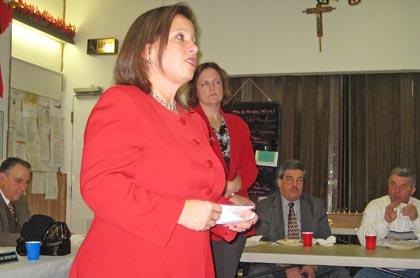By Howard Koplowitz
Community Board 10 Chairwoman Betty Braton announced her nine selections for the 15−member Aqueduct Race Track advisory panel at the board’s monthly meeting last week.
Under the agreement, CB 10 controls nine members of the panel, with Aqueduct naming three and another three from Delaware North, the Buffalo−based company that was chosen to operate video lottery terminals at the track in late October.
Braton selected herself for the panel, along with Donna Gilmartin, chairwoman of CB 10’s Aqueduct Committee; CB 10 member and Ozone Park Civic Association President Howard Kamph; CB 10 member and Richmind Hill South Civic Association President Margaret Finnerty; South Ozone Park Civic Association West President Anthony Gellineau; Intercommunity Civic Association Co−President George Russo; CB 10 member and Ozone Tudor Civic Association President Frank Dardani; Phyllis Ellison, a member of CB 10 and the South Ozone Park Community Development Corporation; and CB 10 member Carmela Malizia.
Seven of the nine are CB 10 members and 44 percent of the selections live within a half mile of Aqueduct, according to Braton.
She said Aqueduct’s selections were Joanne Adams, community relations manager at Aqueduct; NYRA President Charles Heyward; and the lawyer for the track.
It was unclear who Delaware North had selected.
The creation of the panel was included in the state agreement earlier this year that extended the New York Racing Association’s lease of Aqueduct by 25 years. NYRA has controlled the track since 1965.
Also at the meeting, Martha Ayon, an aide to city Comptroller William Thompson, said Thompson is proposing to charge car registrations based on weight instead of the current flat $30 fee.
Ayon said the plan would bring in $1.5 billion for the Metropolitan Transportation Authority, which is facing a $1.2 billion deficit.
The board also heard from U.S. Rep. Anthony Weiner (D−Forest Hills), who said the government is looking for ways to spur the economy by “putting people to work in the best way.”
Weiner suggested the government might start infrastructure projects “that puts people to work, but that also gives something” back to the community.
“The least we could do is put roofs on schools, get ferry service,” the congressman said.
He also touched on the foreclosure and subprime mortgage crises and squared most of the blame on individual homeonwers who should have known that a loan was too good to be true.
“A lot of this, very honestly, brought it on themselves,” Weiner said, although he acknowledged that banks “did something wrong” and there were “poor regulations.”
“The individual has a responsibility,” he said, before turning to the recent bailouts of the banking industry and discussions of a financial rescue package for automobile manufacturers.
“We can’t become a country that says, ‘You made a mistake, that’s O.K., here’s a check, you’re bailed out,’ ” he said.
Reach reporter Howard Koplowitz by e−mail at hkoplowitz@timesledger.com or by phone at 718−229−0300, Ext. 173.



































